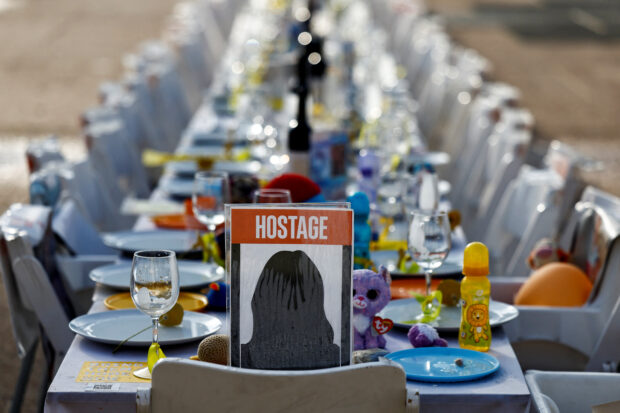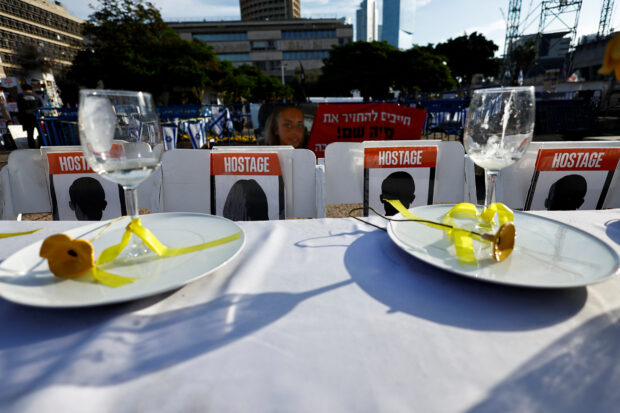Hanukkah in wartime: Israelis take stock two months on

A dinner table is set with empty chairs that symbolically represent Israeli hostages, who are being held in the Gaza Strip after Hamas gunmen seized them on October 7, as the country observes the Jewish festival Hanukkah amid the ongoing conflict between Israel and the Palestinian Islamist group Hamas, in Tel Aviv, Israel December 7, 2023. REUTERS/Clodagh Kilcoyne
JERUSALEM — Two months into a war with Hamas, the faces of Israelis taken hostage in Gaza still appear on individual posters plastered across Jerusalem bus stops and flashed across buildings.
The somber mood was all-consuming on Thursday at the start of Hanukkah, the first Jewish festival since Oct. 7, when Israel says Hamas massacred 1,200 people.
READ: Hundreds more Palestinians killed in Israel’s assault on Hamas in south Gaza
It was a solemn moment for all of Israel and not only for the families of the 138 Israelis still held hostage.
For some Israelis, the feeling is of a country shrinking.
Some 200,000 Israelis have been uprooted from both the south of Israel, where Hamas infiltrated, and the north of Israel, where Hezbollah attacked from Lebanon. Absent tourists because of the war, hotels have accommodated many of the evacuees.
Article continues after this advertisement“Oct. 7 was a day that changed the course of history in Israel,” Foreign Ministry spokesperson Lior Haiat said, calling it “the worst day for the Jewish people since the Holocaust.”
Article continues after this advertisementAghast at the Hamas killings, Israelis have bought up guns with the government’s blessing.
The nation is largely self-absorbed. Israeli television channels, dominated by war news, rarely broadcast scenes from Gaza except to show soldiers in action.
READ: Israel moves into Gaza’s second-largest city, intensifies strikes
Israelis must look to channels abroad to view the landscape of buildings destroyed or vacated during an Israeli bombardment and ground offensive in which Gaza health officials say more than 16,000 people have been killed.
Gone are weekly demonstrations that for months drew hundreds of thousands of Israelis into the streets to protest against a government plan to limit the judiciary they assailed as anti-democratic.
The country seems less polarised, at least for now, as it readies to celebrate Hanukkah.
Commemorating an ancient Jewish victory, Hanukkah is a family festival lasting eight nights and featuring candle lighting and frying of foods in oil because, tradition says, of a miracle that oil found to fuel a ceremonial lamp was only enough for one day, but it burned for eight.
Joe Biden an Israeli hero
Although affected emotionally, many Israelis say the war hasn’t broken them. Psychologist Danny Brom said, though, he had been receiving more patients since Oct. 7.
People struggling not to feel helpless have found purpose in baking cookies and braided challot bread for soldiers, he said, while one woman offered swimming lessons to evacuees at a hotel.
Public opinion is generally with the soldiers and for the continuation of the war.
Israelis take pride in the Iron Dome missile defense system developed in Israel with U.S. backing to counter the rockets fired from Gaza and Lebanon.
Perhaps the biggest hero of the moment is U.S. President Joe Biden, who, in the face of global criticism, has consistently supported Israel’s military action.
A billboard shows Biden smiling in front of Israeli and U.S. flags on Jerusalem’s Emek Refaim Street with the word “Thanks” in English across the top.
Israeli families have publicly thanked Biden, along with Egypt and Qatar, for helping to free the hostages.
Center stage on the activist front are relatives and supporters of the hostages who have set up camp at a Tel Aviv square outside the Defence Ministry, where Israeli Prime Minister Benjamin Netanyahu convenes his war cabinet.
They have renamed the square “Hostages Plaza” and joined in increasingly impatient chants that insist on bringing back their loved ones “Now. Now. Now,” with each “Now” louder than the last.
Fighting for his political survival, Netanyahu cites as priorities wiping out Hamas and the return of the hostages.
A commission of inquiry is expected into the military and political failures that led to the Oct. 7 attack but its work is likely months away with the country focused on the war itself.

A dinner table is set with empty chairs that symbolically represent Israeli hostages, who are being held in the Gaza Strip after they were seized by Hamas gunmen on October 7, as the country observes the Jewish festival Hanukkah amid the ongoing conflict between Israel and the Palestinian Islamist group Hamas, in Tel Aviv, Israel December 7, 2023. REUTERS/Clodagh Kilcoyne
Peace activists eye the day after
Opinion polls show little backing for a decades-old vision of peacemaking with the Palestinians. That, many Israelis say, was blown apart by the actions of an Iranian-backed Hamas committed to Israel’s destruction.
Israeli support for negotiations with the Palestinian Authority dropped 23% in two months, based on a Peace Index survey for the Tel Aviv University International Program in Conflict Resolution and Mediation in late October.
“We are talking about the lowest point for negotiation and the biggest drop in support from one poll to the next that we’ve ever witnessed” in three decades of polling, said Nimrod Rosler, academic head of the program.
Activists for peace with Palestinians and campaigners who, before the war, assailed the Netanyahu government’s judicial overhaul are focused on the war but eyeing the day after.
“You cannot just overthrow this sort of semi-state and not say what is going to happen after that,” said Yael Drier Shilo, a founding member of the Israeli-Palestinian peace group Standing Together.
“We are willing to say we want a moderate Palestinian state and we are willing to negotiate and give them the possibility to dismantle Hamas,” she said.
Meredith Rothbart, CEO of a nonprofit committed to facilitating peace-building, said that with interest growing in its Israeli-Palestinian leadership institute, it has expanded to two tracks – one for CEOs and another for mid-level leaders.
“This moment does not tell me that we have failed. It tells me that maybe other people see what’s needed,” said Rothbart, whose Amal-Tikva organization is a combination of the Arabic and Hebrew words for hope.
Her goal is to engage the two peoples in peacemaking from within their societies – rather than through a diplomatic solution – so that each sees peace as best for its own people.
‘It’s not the time now,’ says protest leader
Ron Scherf founded the Brothers in Arms coalition that mobilized protests against the judicial overhaul. After the Oct. 7 Hamas attack, it pivoted to organize aid to victims, survivors, and soldiers before the government did.
Scherf said it was too early to talk about resuming the anti-government protests.
“I hope they (the government) will be able to take responsibility and understand the guilt and go away. And if not, we will return to the streets when it will be the time for that. It’s not the time now,” he said.